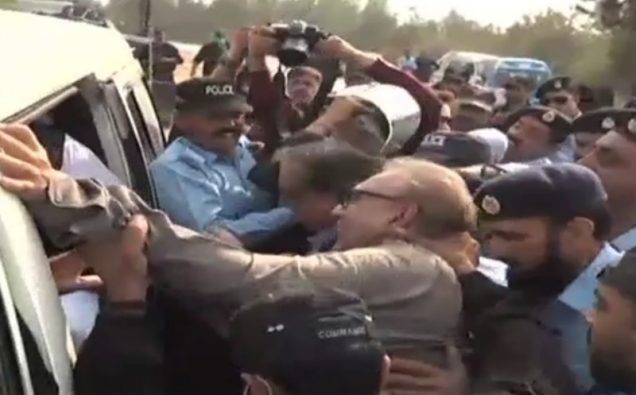
As the Nawaz Sharif government continued heavy-handed action against PTI protesters, Amnesty International urged Islamabad to “immediately and unconditionally” release hundreds of opposition activists and “lift restrictions on their movement.
In a statement the AI asked Islamabad to take all appropriate measures to ensure that people are allowed to exercise their right to peaceful assembly.
Ahead of planned November 2 demonstrations, the Sharif government has intensified its crackdown on supporters of Imran Khan’s Tehreek-e-Insaf party, including by using “unnecessary and excessive force.”
“The police fired tear gas and rubber bullets against protesters and detained hundreds in indiscriminate and arbitrary mass arrests,” the human rights organization said.
Amnesty International said it has received credible reports that “hundreds of people have been arrested under Section 144 of the Penal Code, a draconian colonial-era law that forbids the gathering of more than four people, and represents an undue restriction on the rights to freedom of expression and peaceful assembly.”
“There is no justification for this repressive crackdown. Pakistan’s constitution guarantees people the rights to freedom of assembly, expression and movement. The authorities should immediately and unconditionally release all the people arrested solely for exercising their rights and allow them to protest peacefully,” said Champa Patel, Amnesty International’s South Asia Director.
“Section 144 is a draconian colonial-era law that clearly has no place in a rights-respecting society. It should never be used to unduly restrict the right to freedom of peaceful assembly and needs to be repealed,” said Champa Patel.
“If sporadic incidents of violence occur, the authorities should identify the responsible people. Using the violent acts of a few as a pretext to restrict or impede the rights of a majority is in clear violation of Pakistan’s obligations under international law.”
Amnesty International said it is also concerned by reports that journalists have been intimidated and threatened with violence by protesters demanding favourable coverage.
“Journalists and human rights defenders play an important role during protests. All media workers covering the protests should be allowed to do their jobs freely and without fear of attacks or intimidation,” said Champa Patel















